Leadership Report: Melbourne Market Relocation Challenges
VerifiedAdded on 2022/08/29
|7
|1202
|17
Report
AI Summary
This report analyzes the challenges and strategies associated with the Melbourne market relocation project, focusing on the move from Docklands to Epping. It identifies key challenges such as potential customer loss, business interruption costs, regulatory concerns, staff recruitment difficulties, and insignificant tax incentives. The report then explores strategies to accelerate the project, including early acceleration, fast-tracking dependent activities, removing unnecessary activities, adding resources, and optimizing processes. The analysis is supported by academic peer-reviewed references. The report concludes that market transformation is complex, requiring careful attention to various factors and the need to adapt strategies to suit specific business requirements, ultimately improving operational efficiency and customer satisfaction. The report emphasizes the importance of proactive project management and strategic decision-making in mitigating risks and ensuring project success. The provided resources are leveraged to understand the project's background, stakeholder perspectives, and the impact of delays and cost overruns, offering valuable insights into effective leadership and project management in complex relocation projects.
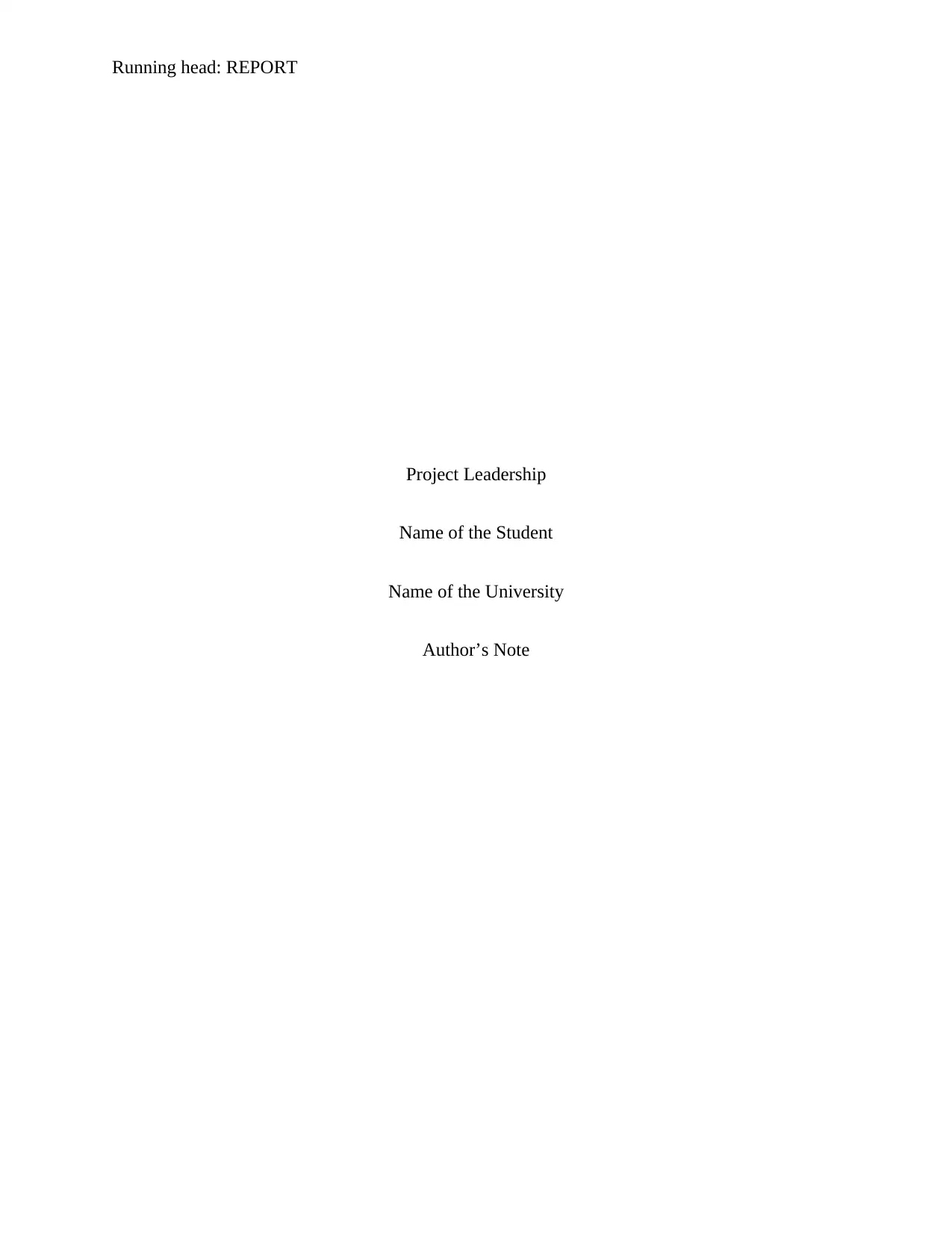
Running head: REPORT
Project Leadership
Name of the Student
Name of the University
Author’s Note
Project Leadership
Name of the Student
Name of the University
Author’s Note
Paraphrase This Document
Need a fresh take? Get an instant paraphrase of this document with our AI Paraphraser
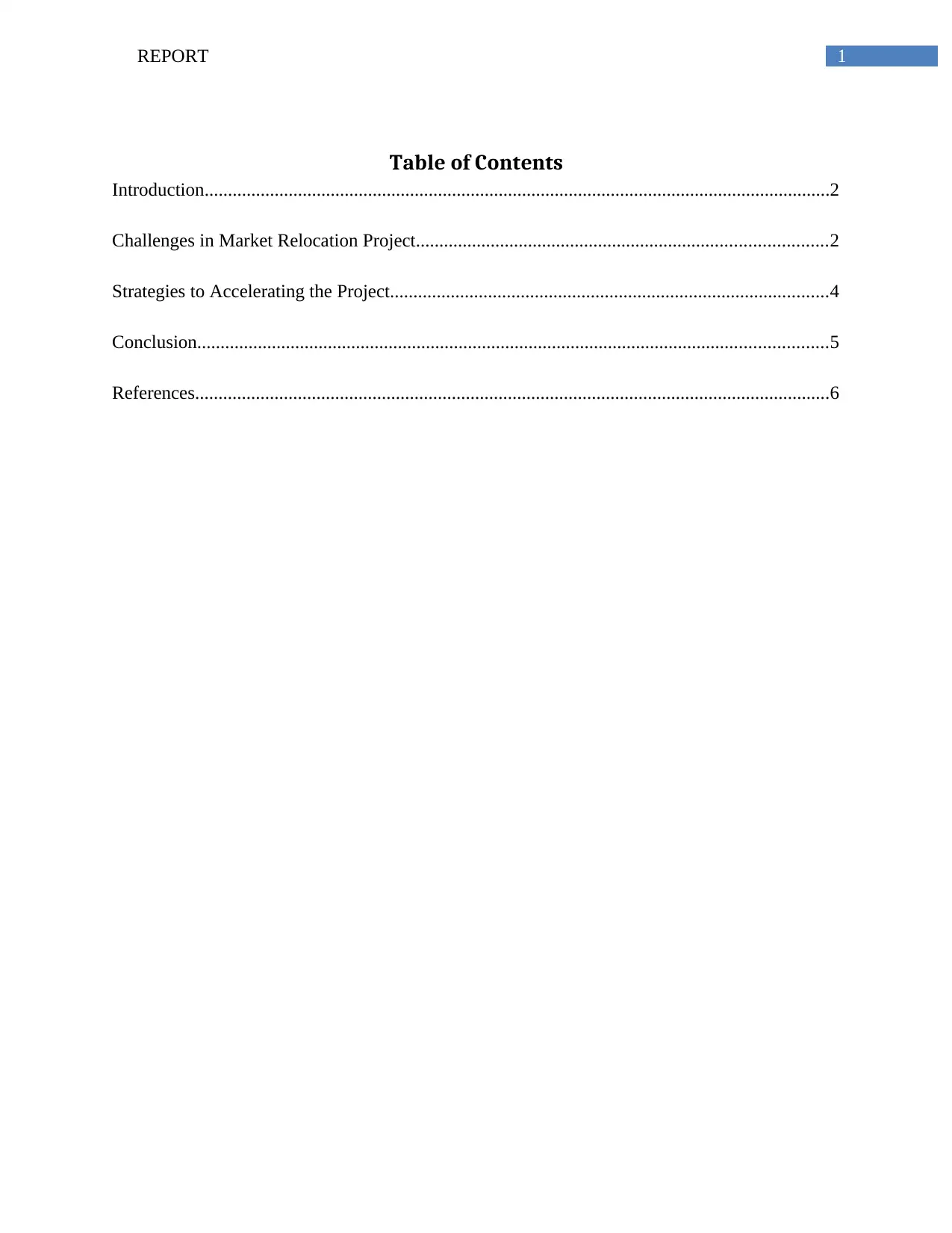
1REPORT
Table of Contents
Introduction......................................................................................................................................2
Challenges in Market Relocation Project........................................................................................2
Strategies to Accelerating the Project..............................................................................................4
Conclusion.......................................................................................................................................5
References........................................................................................................................................6
Table of Contents
Introduction......................................................................................................................................2
Challenges in Market Relocation Project........................................................................................2
Strategies to Accelerating the Project..............................................................................................4
Conclusion.......................................................................................................................................5
References........................................................................................................................................6
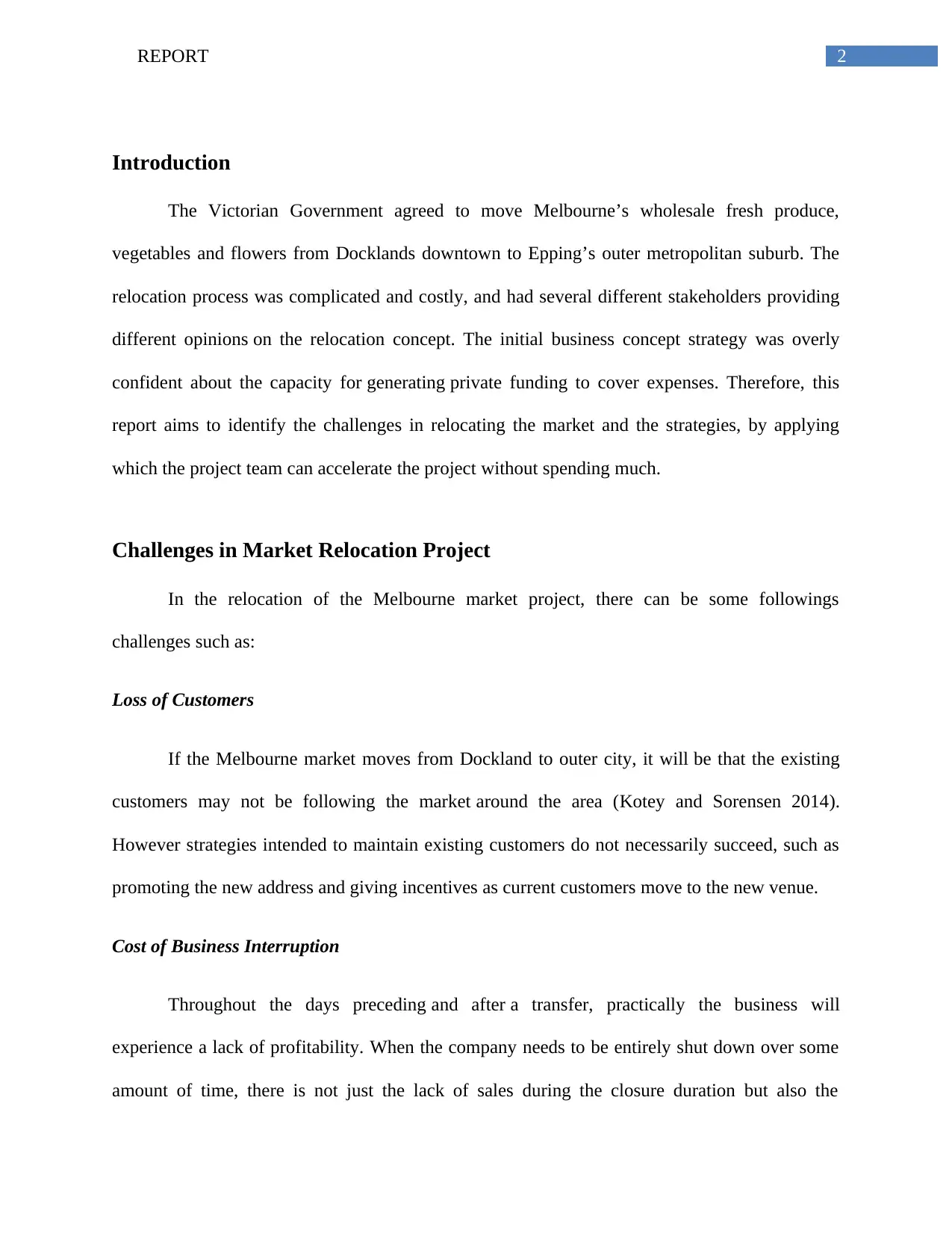
2REPORT
Introduction
The Victorian Government agreed to move Melbourne’s wholesale fresh produce,
vegetables and flowers from Docklands downtown to Epping’s outer metropolitan suburb. The
relocation process was complicated and costly, and had several different stakeholders providing
different opinions on the relocation concept. The initial business concept strategy was overly
confident about the capacity for generating private funding to cover expenses. Therefore, this
report aims to identify the challenges in relocating the market and the strategies, by applying
which the project team can accelerate the project without spending much.
Challenges in Market Relocation Project
In the relocation of the Melbourne market project, there can be some followings
challenges such as:
Loss of Customers
If the Melbourne market moves from Dockland to outer city, it will be that the existing
customers may not be following the market around the area (Kotey and Sorensen 2014).
However strategies intended to maintain existing customers do not necessarily succeed, such as
promoting the new address and giving incentives as current customers move to the new venue.
Cost of Business Interruption
Throughout the days preceding and after a transfer, practically the business will
experience a lack of profitability. When the company needs to be entirely shut down over some
amount of time, there is not just the lack of sales during the closure duration but also the
Introduction
The Victorian Government agreed to move Melbourne’s wholesale fresh produce,
vegetables and flowers from Docklands downtown to Epping’s outer metropolitan suburb. The
relocation process was complicated and costly, and had several different stakeholders providing
different opinions on the relocation concept. The initial business concept strategy was overly
confident about the capacity for generating private funding to cover expenses. Therefore, this
report aims to identify the challenges in relocating the market and the strategies, by applying
which the project team can accelerate the project without spending much.
Challenges in Market Relocation Project
In the relocation of the Melbourne market project, there can be some followings
challenges such as:
Loss of Customers
If the Melbourne market moves from Dockland to outer city, it will be that the existing
customers may not be following the market around the area (Kotey and Sorensen 2014).
However strategies intended to maintain existing customers do not necessarily succeed, such as
promoting the new address and giving incentives as current customers move to the new venue.
Cost of Business Interruption
Throughout the days preceding and after a transfer, practically the business will
experience a lack of profitability. When the company needs to be entirely shut down over some
amount of time, there is not just the lack of sales during the closure duration but also the
⊘ This is a preview!⊘
Do you want full access?
Subscribe today to unlock all pages.

Trusted by 1+ million students worldwide
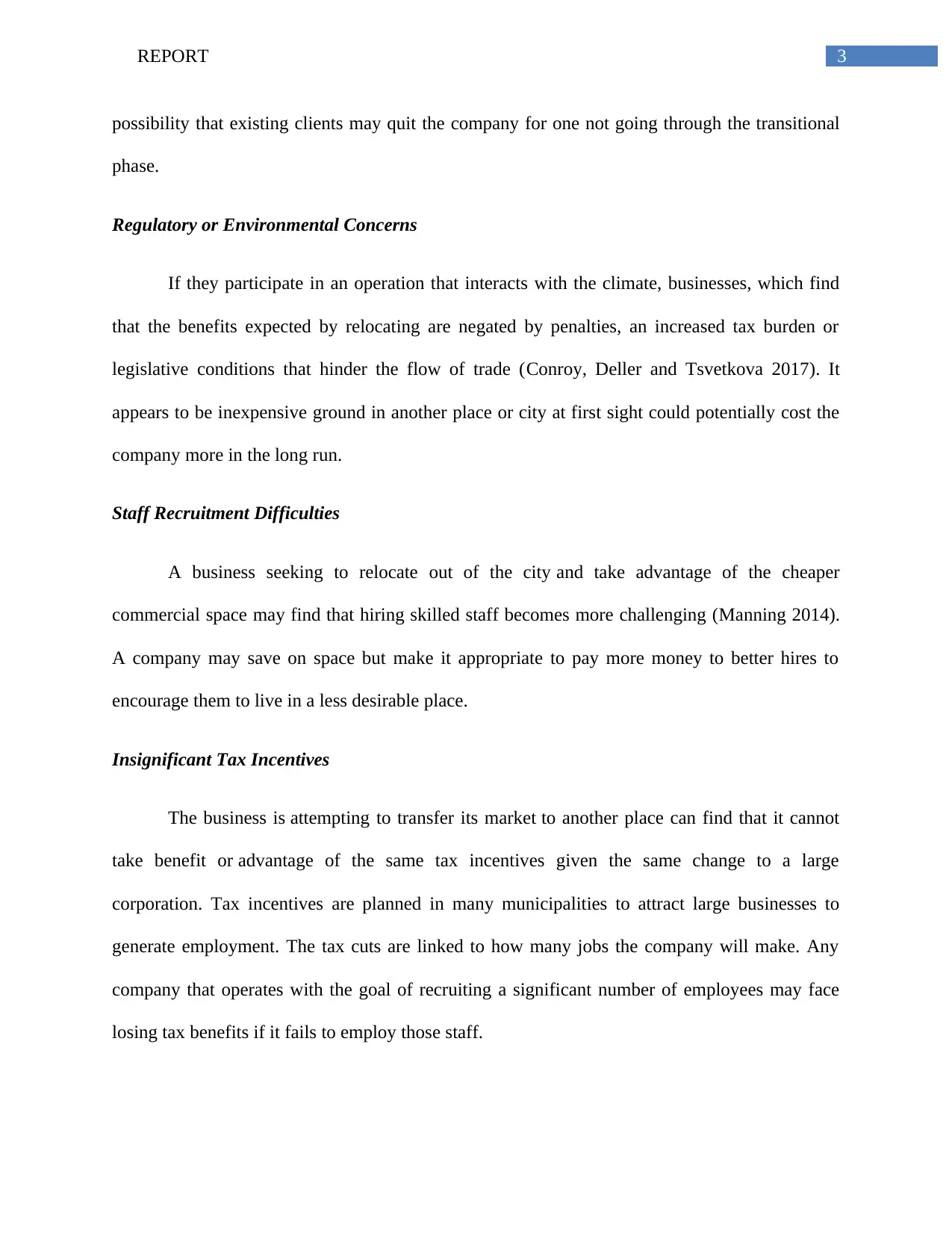
3REPORT
possibility that existing clients may quit the company for one not going through the transitional
phase.
Regulatory or Environmental Concerns
If they participate in an operation that interacts with the climate, businesses, which find
that the benefits expected by relocating are negated by penalties, an increased tax burden or
legislative conditions that hinder the flow of trade (Conroy, Deller and Tsvetkova 2017). It
appears to be inexpensive ground in another place or city at first sight could potentially cost the
company more in the long run.
Staff Recruitment Difficulties
A business seeking to relocate out of the city and take advantage of the cheaper
commercial space may find that hiring skilled staff becomes more challenging (Manning 2014).
A company may save on space but make it appropriate to pay more money to better hires to
encourage them to live in a less desirable place.
Insignificant Tax Incentives
The business is attempting to transfer its market to another place can find that it cannot
take benefit or advantage of the same tax incentives given the same change to a large
corporation. Tax incentives are planned in many municipalities to attract large businesses to
generate employment. The tax cuts are linked to how many jobs the company will make. Any
company that operates with the goal of recruiting a significant number of employees may face
losing tax benefits if it fails to employ those staff.
possibility that existing clients may quit the company for one not going through the transitional
phase.
Regulatory or Environmental Concerns
If they participate in an operation that interacts with the climate, businesses, which find
that the benefits expected by relocating are negated by penalties, an increased tax burden or
legislative conditions that hinder the flow of trade (Conroy, Deller and Tsvetkova 2017). It
appears to be inexpensive ground in another place or city at first sight could potentially cost the
company more in the long run.
Staff Recruitment Difficulties
A business seeking to relocate out of the city and take advantage of the cheaper
commercial space may find that hiring skilled staff becomes more challenging (Manning 2014).
A company may save on space but make it appropriate to pay more money to better hires to
encourage them to live in a less desirable place.
Insignificant Tax Incentives
The business is attempting to transfer its market to another place can find that it cannot
take benefit or advantage of the same tax incentives given the same change to a large
corporation. Tax incentives are planned in many municipalities to attract large businesses to
generate employment. The tax cuts are linked to how many jobs the company will make. Any
company that operates with the goal of recruiting a significant number of employees may face
losing tax benefits if it fails to employ those staff.
Paraphrase This Document
Need a fresh take? Get an instant paraphrase of this document with our AI Paraphraser
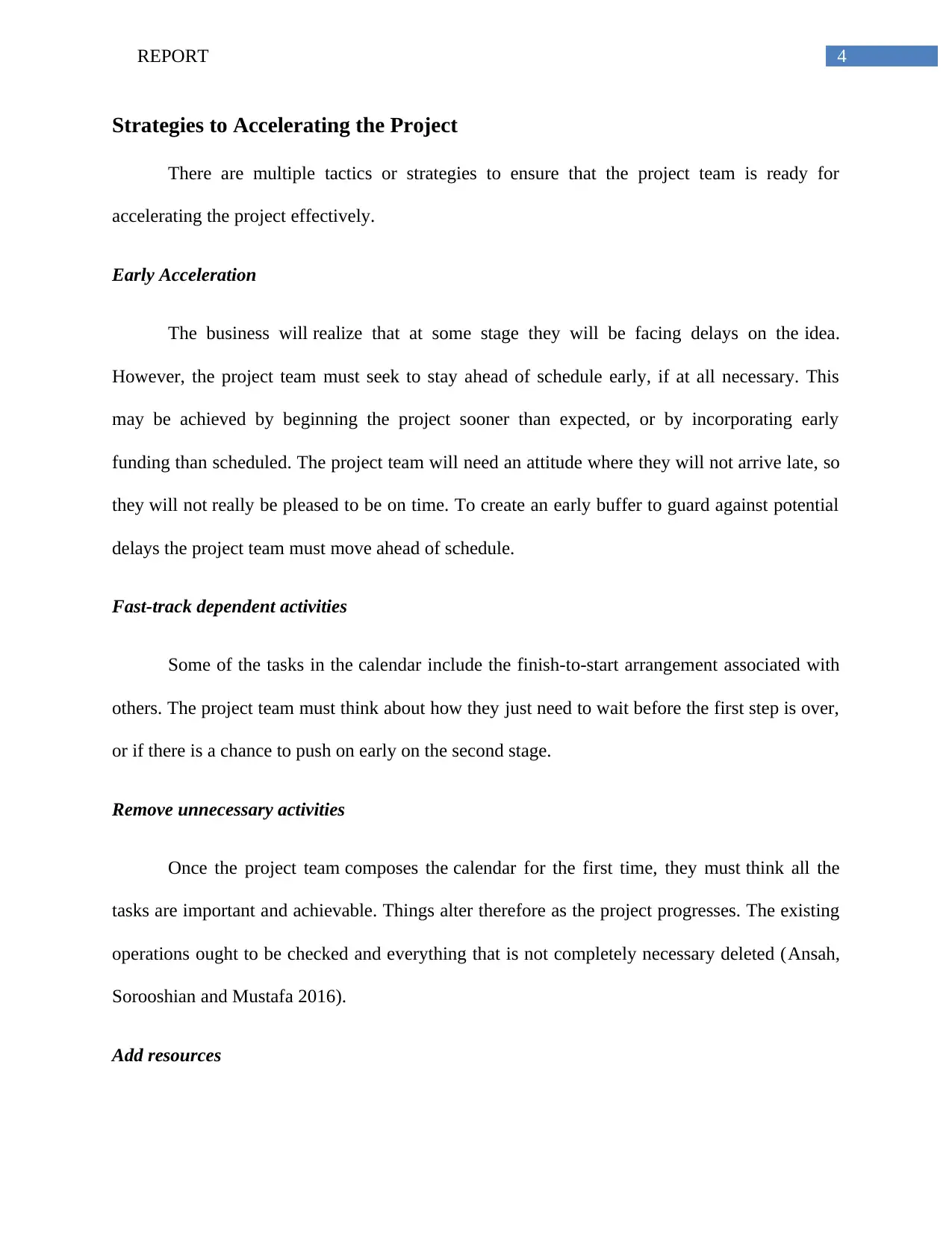
4REPORT
Strategies to Accelerating the Project
There are multiple tactics or strategies to ensure that the project team is ready for
accelerating the project effectively.
Early Acceleration
The business will realize that at some stage they will be facing delays on the idea.
However, the project team must seek to stay ahead of schedule early, if at all necessary. This
may be achieved by beginning the project sooner than expected, or by incorporating early
funding than scheduled. The project team will need an attitude where they will not arrive late, so
they will not really be pleased to be on time. To create an early buffer to guard against potential
delays the project team must move ahead of schedule.
Fast-track dependent activities
Some of the tasks in the calendar include the finish-to-start arrangement associated with
others. The project team must think about how they just need to wait before the first step is over,
or if there is a chance to push on early on the second stage.
Remove unnecessary activities
Once the project team composes the calendar for the first time, they must think all the
tasks are important and achievable. Things alter therefore as the project progresses. The existing
operations ought to be checked and everything that is not completely necessary deleted (Ansah,
Sorooshian and Mustafa 2016).
Add resources
Strategies to Accelerating the Project
There are multiple tactics or strategies to ensure that the project team is ready for
accelerating the project effectively.
Early Acceleration
The business will realize that at some stage they will be facing delays on the idea.
However, the project team must seek to stay ahead of schedule early, if at all necessary. This
may be achieved by beginning the project sooner than expected, or by incorporating early
funding than scheduled. The project team will need an attitude where they will not arrive late, so
they will not really be pleased to be on time. To create an early buffer to guard against potential
delays the project team must move ahead of schedule.
Fast-track dependent activities
Some of the tasks in the calendar include the finish-to-start arrangement associated with
others. The project team must think about how they just need to wait before the first step is over,
or if there is a chance to push on early on the second stage.
Remove unnecessary activities
Once the project team composes the calendar for the first time, they must think all the
tasks are important and achievable. Things alter therefore as the project progresses. The existing
operations ought to be checked and everything that is not completely necessary deleted (Ansah,
Sorooshian and Mustafa 2016).
Add resources
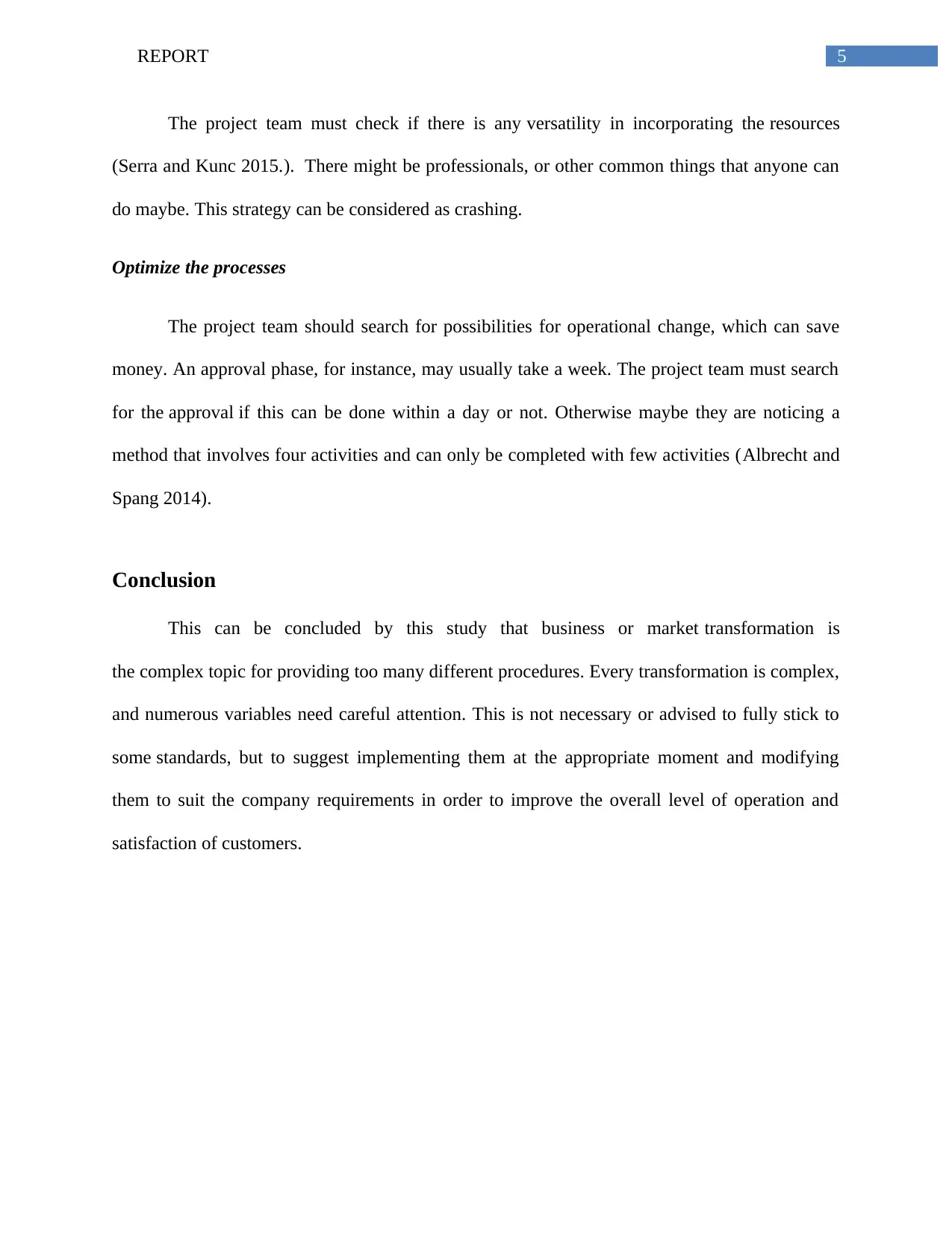
5REPORT
The project team must check if there is any versatility in incorporating the resources
(Serra and Kunc 2015.). There might be professionals, or other common things that anyone can
do maybe. This strategy can be considered as crashing.
Optimize the processes
The project team should search for possibilities for operational change, which can save
money. An approval phase, for instance, may usually take a week. The project team must search
for the approval if this can be done within a day or not. Otherwise maybe they are noticing a
method that involves four activities and can only be completed with few activities (Albrecht and
Spang 2014).
Conclusion
This can be concluded by this study that business or market transformation is
the complex topic for providing too many different procedures. Every transformation is complex,
and numerous variables need careful attention. This is not necessary or advised to fully stick to
some standards, but to suggest implementing them at the appropriate moment and modifying
them to suit the company requirements in order to improve the overall level of operation and
satisfaction of customers.
The project team must check if there is any versatility in incorporating the resources
(Serra and Kunc 2015.). There might be professionals, or other common things that anyone can
do maybe. This strategy can be considered as crashing.
Optimize the processes
The project team should search for possibilities for operational change, which can save
money. An approval phase, for instance, may usually take a week. The project team must search
for the approval if this can be done within a day or not. Otherwise maybe they are noticing a
method that involves four activities and can only be completed with few activities (Albrecht and
Spang 2014).
Conclusion
This can be concluded by this study that business or market transformation is
the complex topic for providing too many different procedures. Every transformation is complex,
and numerous variables need careful attention. This is not necessary or advised to fully stick to
some standards, but to suggest implementing them at the appropriate moment and modifying
them to suit the company requirements in order to improve the overall level of operation and
satisfaction of customers.
⊘ This is a preview!⊘
Do you want full access?
Subscribe today to unlock all pages.

Trusted by 1+ million students worldwide
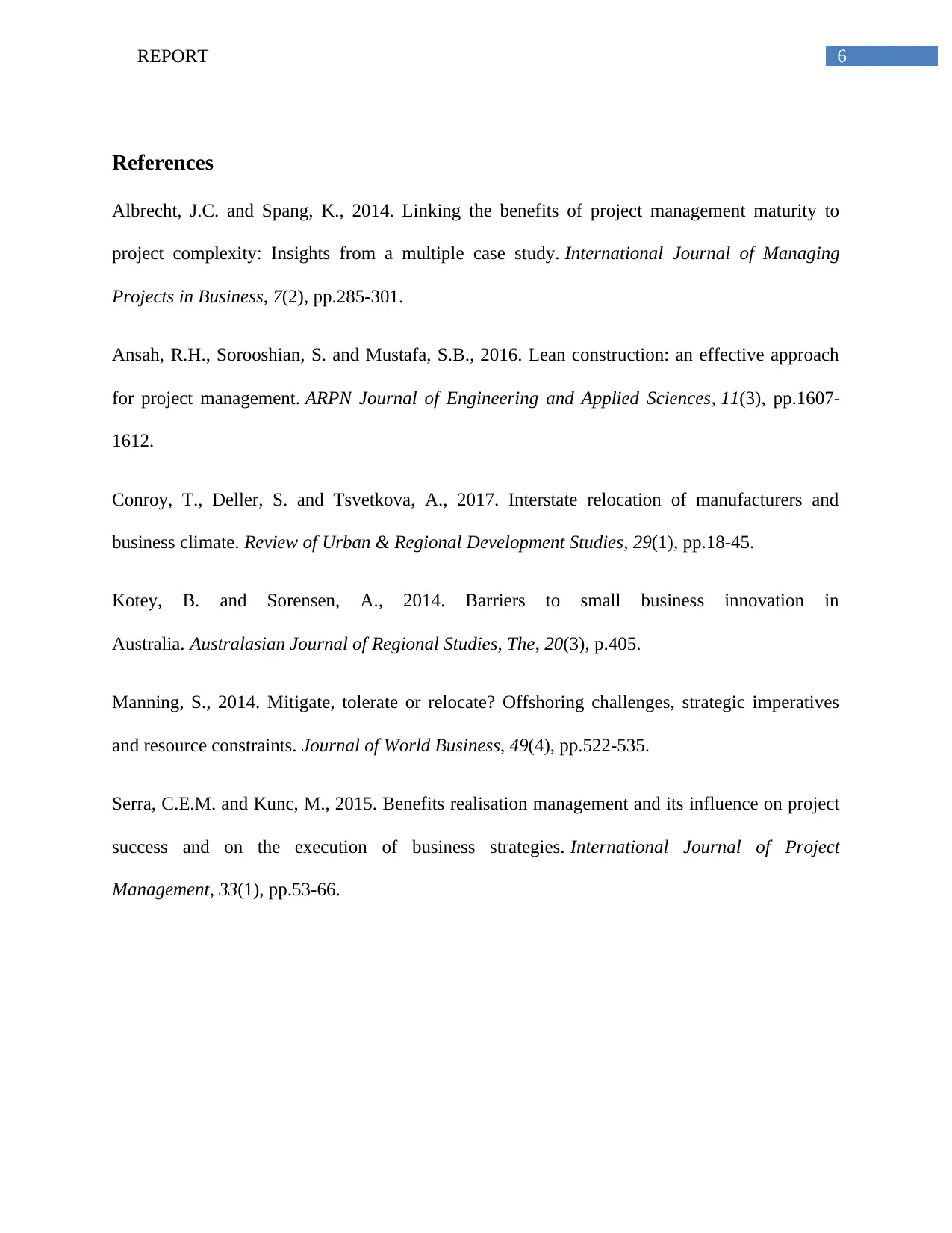
6REPORT
References
Albrecht, J.C. and Spang, K., 2014. Linking the benefits of project management maturity to
project complexity: Insights from a multiple case study. International Journal of Managing
Projects in Business, 7(2), pp.285-301.
Ansah, R.H., Sorooshian, S. and Mustafa, S.B., 2016. Lean construction: an effective approach
for project management. ARPN Journal of Engineering and Applied Sciences, 11(3), pp.1607-
1612.
Conroy, T., Deller, S. and Tsvetkova, A., 2017. Interstate relocation of manufacturers and
business climate. Review of Urban & Regional Development Studies, 29(1), pp.18-45.
Kotey, B. and Sorensen, A., 2014. Barriers to small business innovation in
Australia. Australasian Journal of Regional Studies, The, 20(3), p.405.
Manning, S., 2014. Mitigate, tolerate or relocate? Offshoring challenges, strategic imperatives
and resource constraints. Journal of World Business, 49(4), pp.522-535.
Serra, C.E.M. and Kunc, M., 2015. Benefits realisation management and its influence on project
success and on the execution of business strategies. International Journal of Project
Management, 33(1), pp.53-66.
References
Albrecht, J.C. and Spang, K., 2014. Linking the benefits of project management maturity to
project complexity: Insights from a multiple case study. International Journal of Managing
Projects in Business, 7(2), pp.285-301.
Ansah, R.H., Sorooshian, S. and Mustafa, S.B., 2016. Lean construction: an effective approach
for project management. ARPN Journal of Engineering and Applied Sciences, 11(3), pp.1607-
1612.
Conroy, T., Deller, S. and Tsvetkova, A., 2017. Interstate relocation of manufacturers and
business climate. Review of Urban & Regional Development Studies, 29(1), pp.18-45.
Kotey, B. and Sorensen, A., 2014. Barriers to small business innovation in
Australia. Australasian Journal of Regional Studies, The, 20(3), p.405.
Manning, S., 2014. Mitigate, tolerate or relocate? Offshoring challenges, strategic imperatives
and resource constraints. Journal of World Business, 49(4), pp.522-535.
Serra, C.E.M. and Kunc, M., 2015. Benefits realisation management and its influence on project
success and on the execution of business strategies. International Journal of Project
Management, 33(1), pp.53-66.
1 out of 7
Related Documents
Your All-in-One AI-Powered Toolkit for Academic Success.
+13062052269
info@desklib.com
Available 24*7 on WhatsApp / Email
![[object Object]](/_next/static/media/star-bottom.7253800d.svg)
Unlock your academic potential
Copyright © 2020–2026 A2Z Services. All Rights Reserved. Developed and managed by ZUCOL.




